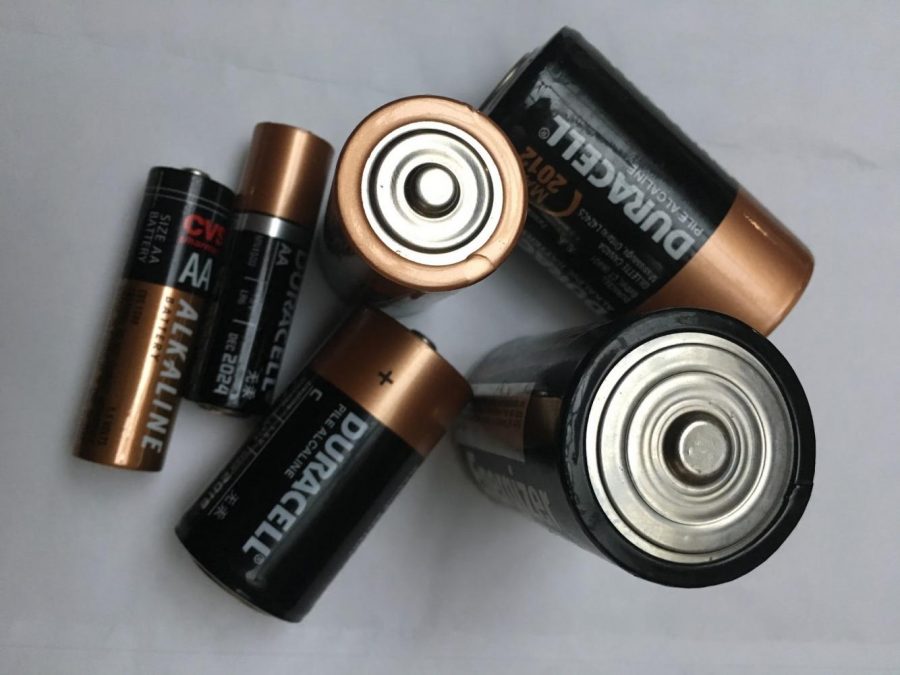Batteries: The dangers and how to prevent them
October 14, 2017
A small fire ignited in the robotics room last Wednesday night with evidence pointing towards a charging battery as the cause. Two types of batteries were in the robotics supply room closet when the fire broke out: standard batteries and lithium ion batteries.
Lithium ion batteries are notorious for sparking fires and on some occasions exploding. In 2006, a recall of nearly six million Sony lithium ion battery packs was issued after several batteries caused fires or imploded. Subsequent investigations showed that the dangerous anomalies resulted from different metallic components of the battery accidentally touching and causing a short circuit.
Although lithium ion batteries are now less likely to cause fires, they can still be triggered by charging at extremely low temperatures, shaking prior to use and storing at extremely high temperatures.
Dolan Dworak (12) designed a company in his sophomore year for DECA that produced special containers for lithium ion batteries that mitigated the damage done in the case of an explosion. This idea carried him and his team to become finalists at ICDC, the International Career Development Conference. Dolan emphasizes his inspiration for the company was the potential harm faulty batteries could cause.
“In the year that we launched the company alone, there have been countless home fires, batteries even took down three full size cargo planes, and obviously the faulty Samsung phones were in circulation so the batteries are potentially deadly,” Dolan said.
After long periods of usage, batteries are also known to leak acid, which is especially dangers to the skin and eye. Breathing in the leaked chemicals has also been proven to cause brain and kidney damage.
In order to prevent future battery hazards, batteries must be properly stored in cool and dry places where they have no chance of overheating. Batteries and their respective equipment should also be stored separately as to not drain the batteries and reduce harmful acid or chemical leaks due to prolonged stress. However, the overwhelming majority of battery mishaps happen do to extremely rare defects in the battery that the average consumer would not be able recognize nor prevent.
Alejandro Osorio, an upper school technician, highlighted the danger of leaked chemicals after using batteries for too long.
“If removable double A and triple A batteries are left inside devices where they are actively producing a current for too long, that is when they are by far the worst as they can corrode over time due to the acid inside of them,” Osorio said. “Depending on the type of battery, chemicals such as calcium and other debris will leak out from inside the battery, and people should never touch these chemicals since they can still harm you.”


















![“[Building nerf blasters] became this outlet of creativity for me that hasn't been matched by anything else. The process [of] making a build complete to your desire is such a painstakingly difficult process, but I've had to learn from [the skills needed from] soldering to proper painting. There's so many different options for everything, if you think about it, it exists. The best part is [that] if it doesn't exist, you can build it yourself," Ishaan Parate said.](https://harkeraquila.com/wp-content/uploads/2022/08/DSC_8149-900x604.jpg)




![“When I came into high school, I was ready to be a follower. But DECA was a game changer for me. It helped me overcome my fear of public speaking, and it's played such a major role in who I've become today. To be able to successfully lead a chapter of 150 students, an officer team and be one of the upperclassmen I once really admired is something I'm [really] proud of,” Anvitha Tummala ('21) said.](https://harkeraquila.com/wp-content/uploads/2021/07/Screen-Shot-2021-07-25-at-9.50.05-AM-900x594.png)







![“I think getting up in the morning and having a sense of purpose [is exciting]. I think without a certain amount of drive, life is kind of obsolete and mundane, and I think having that every single day is what makes each day unique and kind of makes life exciting,” Neymika Jain (12) said.](https://harkeraquila.com/wp-content/uploads/2017/06/Screen-Shot-2017-06-03-at-4.54.16-PM.png)








![“My slogan is ‘slow feet, don’t eat, and I’m hungry.’ You need to run fast to get where you are–you aren't going to get those championships if you aren't fast,” Angel Cervantes (12) said. “I want to do well in school on my tests and in track and win championships for my team. I live by that, [and] I can do that anywhere: in the classroom or on the field.”](https://harkeraquila.com/wp-content/uploads/2018/06/DSC5146-900x601.jpg)
![“[Volleyball has] taught me how to fall correctly, and another thing it taught is that you don’t have to be the best at something to be good at it. If you just hit the ball in a smart way, then it still scores points and you’re good at it. You could be a background player and still make a much bigger impact on the team than you would think,” Anya Gert (’20) said.](https://harkeraquila.com/wp-content/uploads/2020/06/AnnaGert_JinTuan_HoHPhotoEdited-600x900.jpeg)

![“I'm not nearly there yet, but [my confidence has] definitely been getting better since I was pretty shy and timid coming into Harker my freshman year. I know that there's a lot of people that are really confident in what they do, and I really admire them. Everyone's so driven and that has really pushed me to kind of try to find my own place in high school and be more confident,” Alyssa Huang (’20) said.](https://harkeraquila.com/wp-content/uploads/2020/06/AlyssaHuang_EmilyChen_HoHPhoto-900x749.jpeg)







